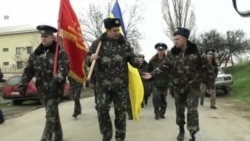LONDON —
Russia’s military moves in Ukraine have drawn criticism from around the world, particularly from the United States and Europe. Experts say Western nations have few options for influencing the situation, but a political solution might still be possible.
As U.S. Secretary of State John Kerry becomes the latest of several senior western officials to visit Kyiv to show support for the interim government, there is talk of sanctions. Russia’s moves have already put the plan for a G8 summit there this year in doubt.
However, that is not likely to impress Russian President Vladimir Putin according to Russia expert Keir Giles of London’s Chatham House.
“We have seen time and again, when situations similar to this arise, there is only one message and only one method that gets through to Russia that it’s time to stop, and that is brute force of the kind that Russia employs itself,” Giles said.
Indeed, Putin was defiant at a Moscow news conference Tuesday.
"If we see that lawlessness starting in eastern regions too, if people ask us for help, we have already an official request from the legitimate president and we reserve the right to use all options at our disposal," Putin told reporters in his first public comment on the situation in Ukraine since ousted president Viktor Yanukovych fled the country.
But Putin also spoke about the need for a new constitution in Ukraine and a “change of power.”
Analysts say no one wants a war in Ukraine. Russian and Ukrainian forces have done their best to avoid one - including during a confrontatio in Crimea Tuesday between unarmed Ukrainian troops and Russian-backed guards at a military base.
According to some experts, Putin’s goals in Ukraine are more political than military, designed to prevent any sharp move toward the West.
Sam Greene, director of the Russia Institute at London’s King’s College, says the best way for the West to ensure that Russia does not go too far is through economic pressure.
“The more powerful options for the West come with the understanding of the degree to which Putin’s key constituency, which is the economic elite, are dependent on the West," Greene said.
Russia has business interests all over the world, and Ukraine is home to a key pipeline that delivers Russian natural gas to the West.
Still, some experts and leaders criticize talk of economic pressure, saying it would not be effective and could hurt the West as much as it hurts Russia.
That leaves Western leaders with difficult choices to make, but at least the possibility that political compromise could solve what now seems like a military challenge.
As U.S. Secretary of State John Kerry becomes the latest of several senior western officials to visit Kyiv to show support for the interim government, there is talk of sanctions. Russia’s moves have already put the plan for a G8 summit there this year in doubt.
However, that is not likely to impress Russian President Vladimir Putin according to Russia expert Keir Giles of London’s Chatham House.
“We have seen time and again, when situations similar to this arise, there is only one message and only one method that gets through to Russia that it’s time to stop, and that is brute force of the kind that Russia employs itself,” Giles said.
Indeed, Putin was defiant at a Moscow news conference Tuesday.
"If we see that lawlessness starting in eastern regions too, if people ask us for help, we have already an official request from the legitimate president and we reserve the right to use all options at our disposal," Putin told reporters in his first public comment on the situation in Ukraine since ousted president Viktor Yanukovych fled the country.
But Putin also spoke about the need for a new constitution in Ukraine and a “change of power.”
Analysts say no one wants a war in Ukraine. Russian and Ukrainian forces have done their best to avoid one - including during a confrontatio in Crimea Tuesday between unarmed Ukrainian troops and Russian-backed guards at a military base.
According to some experts, Putin’s goals in Ukraine are more political than military, designed to prevent any sharp move toward the West.
Sam Greene, director of the Russia Institute at London’s King’s College, says the best way for the West to ensure that Russia does not go too far is through economic pressure.
“The more powerful options for the West come with the understanding of the degree to which Putin’s key constituency, which is the economic elite, are dependent on the West," Greene said.
Russia has business interests all over the world, and Ukraine is home to a key pipeline that delivers Russian natural gas to the West.
Still, some experts and leaders criticize talk of economic pressure, saying it would not be effective and could hurt the West as much as it hurts Russia.
That leaves Western leaders with difficult choices to make, but at least the possibility that political compromise could solve what now seems like a military challenge.





